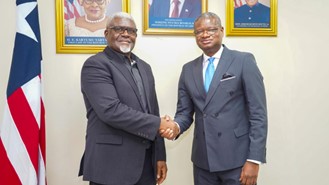The meeting between UNDP Liberia Resident Representative, Aliou Dia, and the Director General of the Liberian Cabinet Secretariat, Nathaniel Kwabo, centered around two key initiatives crucial for Liberia’s national development: the Performance Management and Compliance System (PMCS) and the Accelerated Community Development Programme (ACDP). Both officials acknowledged the importance of collaboration and strategic alignment to drive progress on these fronts. Mr. Dia outlined UNDP’s commitment to revitalizing the ACDP, aligning it with the Liberian government’s Arrest Agenda for Inclusive Development (AAID) and County Development Agenda (CDA). He underscored the potential of partnerships to overcome resource constraints and emphasized the critical role of strategic communication in clarifying the PMCS process and managing public perception. Furthermore, he suggested integrating digitization and artificial intelligence into UNDP’s Country Program Document to enhance Liberia’s digital capabilities. Mr. Kwabo expressed his appreciation for UNDP’s ongoing support, particularly in the PMCS implementation, and highlighted the significant milestones achieved thus far, including the system’s high-level launch, training of focal persons, and a benchmarking study tour to Sierra Leone.
The discussion surrounding the ACDP emphasized its potential to become a cornerstone of Liberia’s development strategy. By realigning the program with the AAID and CDA, UNDP aims to ensure that development efforts are directly linked to the government’s overarching vision and priorities. Mr. Dia’s experience in implementing similar programs in other African nations offers valuable insights and best practices that can be adapted to the Liberian context. Recognizing that financial resources may be limited, Mr. Dia proposed exploring partnerships with other institutions as a means of securing additional funding and expertise. This collaborative approach would leverage the strengths of various stakeholders and create a more sustainable framework for community development.
The PMCS, designed to enhance government effectiveness and accountability, was another focal point of the meeting. Mr. Dia stressed the crucial role of strategic communication in ensuring public understanding and support for the PMCS. He cautioned against potential misinterpretations and emphasized the need for clear messaging that highlights the link between the Ministries, Agencies, and Commissions (MACs) operational work and the performance indicators outlined in their contracts with the President. This proactive communication strategy would not only educate the public but also preempt misinformation and build trust in the government’s performance management framework. The integration of digital tools and artificial intelligence into the PMCS was also proposed as a means of further enhancing its efficiency and effectiveness.
Mr. Kwabo underscored the importance of the meeting in fostering mutual understanding and strengthening collaboration between UNDP and the Liberian government. He expressed gratitude for UNDP’s support in revamping the PMCS, particularly the recruitment of a consultant who played a key role in the system’s overhaul. He cited several key achievements in the PMCS implementation, including the high-level launch, the training of 280 PMCS focal persons across various government agencies, the signing of performance contracts, and a pivotal study tour to Sierra Leone. The study tour provided invaluable insights into the practical application of a robust performance management system and demonstrated how it can be effectively integrated into all levels of governance, from central government down to local units.
Mr. Kwabo highlighted Sierra Leone’s successful utilization of the PMCS as a basis for rewards and recognition, resource mobilization, and allocation. This model offers valuable lessons for Liberia as it seeks to strengthen its own performance management framework. He outlined future plans for the PMCS, including the alignment of the second cycle of target setting with the AAID and CDA, ensuring that key performance indicators are directly linked to the mandates and service charters of the MACs. This alignment would further enhance the effectiveness of the PMCS by ensuring that performance evaluation is directly tied to the core responsibilities of each government agency.
Finally, Mr. Kwabo emphasized the importance of incorporating a Citizens’ Feedback Mechanism into the PMCS, providing a platform for public input and ensuring that government performance is responsive to citizen needs. This participatory approach would strengthen accountability and enhance public trust in the government’s performance management system. He also highlighted the need to review and update the cabinet manual to reflect current realities and best practices, thereby strengthening the overall framework for government operations and ensuring its continued relevance and effectiveness. The collaborative efforts between UNDP and the Liberian government, focused on strengthening the PMCS and revitalizing the ACDP, represent a significant step towards achieving Liberia’s development goals.


